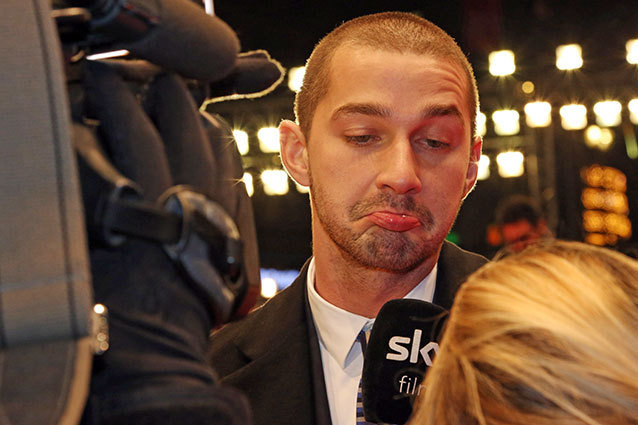 WENN
WENN
Everybody knew at least one kid growing up who would copy and paste articles from the Internet or encyclopedias and attempt to turn them in as part of an assignment. Well, it turns out that Hollywood has that kid too, and his name is Shia LaBeouf. On Monday, LaBeouf released his directorial debut, the short film Howardcontour.com, online, where it received some acclaim, but was mostly regarded with the same kind of indifference that greets every “artistic” project James Franco undertakes. Then, several critics and bloggers began to notice that LaBeouf’s film bore several striking resemblances to the graphic novel Justin M. Damiano by Daniel Clowes, and began to dissect the two works, only to find that in addition to plot similarities, HowardContour.com included direct quotes from Clowes’ text and many of the film’s shots were almost identical to panels in the novel. But there’s no reference in the film, its promotional or press materials or any interviews LaBeouf has given about the project that gives any kind of credit to Clowes.
In response, the film was quickly taken down and password-protected. However, LaBeouf knows that the best thing to do when you’re caught passing off someone else’s work as your own is to apologize, and he did so in a series of tweets where he explained that he was a fan of Clowes’ work, and that it was the inspiration for Howardzzzvontour.com, but “in my excitement and naiveté as an amateur filmmaker, I got lost in the creative process and neglected to follow proper accreditation. [I’m] embarrassed that I failed to credit @danielclowes for his original graphic novella Justin M. Damiano, which served as my inspiration. I was truly moved by his piece of work & I knew that it would make a poignant & relevant short. I apologize to all who assumed I wrote it.” He also added that “deeply regret[s]” what happened, and ended his apology with a succinct summation of the events that transpired, by stating “I f***ed up.”
Unfortunately for LaBeouf, there’s a small problem with his apology. No, it’s not that he expects us to believe that it was possible for him to just “forget” to credit Clowes despite basically adapting his work. Instead, it’s the very first tweet in his apology, in which he proclaims that “Copying isn’t particularly creative work. Being inspired by someone else’s idea to produce something new and different IS creative work.”, which BuzzFeed noticed happened to be eerily similar to an entry on Yahoo Answers from several years ago, written by a user named Lili. Of course, it could just be an unfortunate coincidence, but things aren’t looking good for LaBeouf right now.
But we’re not just upset about the fact that LaBeouf attempted to steal someone else’s hard work. We’re also upset because, well, we should have seen this coming. After all, almost a year ago it was revealed that the touching, poignant, thought-provoking poem the actor “wrote” for Alec Baldwin after leaving the Broadway production of Orphans was actually plagiarized from an Esquire article by Tom Chiarella. And yet, despite our disappointment and shame, we wanted to believe that LaBeouf had changed. We didn’t think to suspect that he could be up to his old tricks. We had forgiven, forgotten and moved on, and now, we are back in the same place that we were last February, feeling the same disappointment and shame.
Putting our hurt feelings aside for a moment, though, we’re primarily wondering why LaBeouf constantly thinks he can get away with plagiarizing other people’s work. Did he miss the day in middle school when our teachers sat us down and defined plagiarism and its consequences? Did he skip the high school English classes where we learned how to properly cite other works in our term papers? Did he never have to submit anything to Turn It In.com like the rest of the world did? And, failing all of that, did he never watch a single episode of any children’s show where cartoon characters taught us about how stealing is bad? We’re pretty sure there was even an episode of Even Stevens dedicated to that concept, so he must have heard it at some point in his life.
Just in case nobody has ever sat LaBeouf down and explained plagiarism to him, assuming it would just be common sense, allow us to do the honor. So, Shia, listen up: if you want to use someone else’s words in something you’re making, you need to give them credit. We recommended you try footnotes, or even MLA-style parenthetical. Throw a credit up onscreen at the end of your film. Begin quotes with the phrase “In the words of…” It’s okay to be inspired by someone’s words or art. It’s okay to reference someone else’s work. Just stop thinking that nobody will notice if you incorporate large portions of other people’s work into your projects, and then attempt to pass the whole thing off as solely your idea. It just makes you look like a jerk.
And if you have trouble remembering all of that, just keep in mind that old adage: fool us once, shame on you. Fool us twice, shame on us. Fool us three times, however, and we will start requiring you to turn in a Works Cited document with every project, statement, apology or tweet you release.


